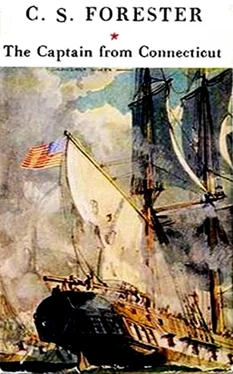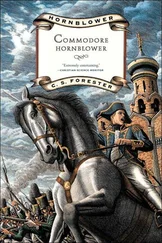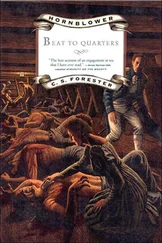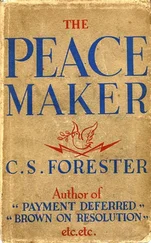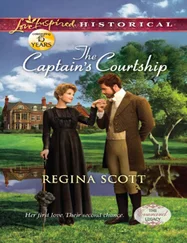The lookouts were at their dizzy posts at the fore and main top-gallant mastheads, swinging in vast circles against the blue sky as the Delaware soared superbly over the waves. They were on duty; so were Mr. Hubbard and Midshipman Quincy, walking the deck with their telescopes under their arms, and so were the men at the wheel. So were the two carpenter’s mates at work on the deck planking aft by the taffrail—there was a bloodstain there which no amount of scrubbing during the past few days had been able to remove, and by Mr. Hubbard’s orders a section of planking was being replaced. Mr. Hubbard would not on any account have bloodstains marring the spotless white of his decks.
Otherwise, in this dog watch, the ship’s company was free. Forward the deck was covered with little groups of men, chattering, sewing their clothes, or merely lounging in idleness; aft the ship’s officers were taking air and exercise, lieutenants, the master, the surgeon and his mate, walking solemnly up and down their little bits of deck, and turning inwards towards each other at each end of their beats without a break in their conversation, while up in the mizzen rigging half a dozen midshipmen were valorously emulating the athletic feats of young master’s mate Hayward who was leading a game of follow-my-leader.
On a day like this all troubles could be forgotten. The memory of the bitter cold of the blizzard in which they had started had vanished as completely as the ice which had festooned the ship, and already the memory of the dead whom they had left behind them was beginning to fade along with it. The sun was warm and not too warm; the ship had her studding sails set slow and aloft; there were sparkling rainbows in the spray tossed from the bows, and sail drill and gun drill had ceased for the day. There was nothing more that a sailor’s heart could desire.
Peabody came on deck, a cigar all ready for smoking between his teeth, and the officers herded away respectfully from his side of the deck. He lit his cigar from the smouldering bit of punk which during the dog watches was left in a tub aft for the convenience of the officers, and inhaled deeply as he glanced round the ship as every captain since the world began has done on his arrival on deck. All sail set and drawing well—the cut of that main course was a perfect masterpiece. She must be going all of the eleven knots which he had noted on the traverse board on his way on deck. And tobacco was good on a sunny evening like this—he drew again deeply on his cigar. It was several hours since he last smoked, for Peabody had a strict rule against smoking below deck, and he had been confined below for several hours dealing with the ship’s papers. Most of what he had been doing was the clerk’s work, but Peabody was fully conscious of his own competence to deal with it, and guiltily conscious of the clerk’s inability. And he had not wanted to bother the boy; he looked sharply across the deck and saw him leaning, gloomy and solitary, against the taffrail with his back to all the merriment and light-heartedness of the ship.
That was a pity. Peabody would have preferred to see Jonathan skylarking up in the rigging along with the midshipmen, and he sighed a little. The boy was a little too old to adapt himself readily to a life at sea. Peabody blamed himself for not having obtained his captaincy earlier so that he could have rescued the boy from the plough—from his mother and father—a little younger, before he got so set in his gloomy habits, when it would have been easy to initiate him into the pleasant delights of algebra and spherical trigonometry and gradually make him into a midshipman, a lieutenant, and in the end a captain. He himself was profoundly grateful to Providence for what he had received. He was captain of this superb ship. He had work to do which he felt competent to perform—that was a most gratifying feeling. And he was already wealthy. As captain he was paid the enormous salary of one hundred dollars a month—a stupendous amount. The Connecticut farm did not produce one hundred dollars a year in real money; the terrible father who had beaten him as a child had never in his whole life held in his hands the sum which his son received monthly. There was a grim, unpleasing pleasure in the thought.
But he should have reached this eminence five years ago, for Jonathan’s sake, saving his five years of frightening tyranny, five years of a maudlin mother’s insane antics. There was every excuse in the world for the boy; but tobacco did not taste so good now. He walked across the deck to pitch his half-smoked cigar overboard to leeward, and Hubbard took off his hat to his captain with the formal courtesy which characterised him—the formality of the Navy combined with the graces of the South.
Here came the marine band, all six of them marching stiffly behind their sergeant, two side drums and four fifes, the sergeant saluting captain and quarterdeck with a single gesture. He swung his brass-mounted cane, and the drums gave their triple roll before beginning their exhilarating rhythm while the fifes squeaked bravely away at “Yankee Doodle.” Up and down, up and down, marched the marines; the fifers in their tall stocks were purple in the face with the effort of blowing. It was all very gay and lighthearted; even Peabody caught the infection. To be at sea again, to have broken the close blockade, was stimulating and exhilarating. The prospect of action cheered everyone on board. The sail drill and the gun drill during those tedious weeks in the East River had been dull and pointless, but now there was a chance of putting them to use. And every man on board, except for Jonathan Peabody and some of the midshipmen, was an experienced sailor, with the sea in his blood. The joys of home, of life in port, were not exaggerated, but were liable to cause surfeit, and some of the men on board had not been to sea for two years now. They felt as if they were free of chains.
On the starboard beam the sun was setting in a glory of red. Three bars of cloud, as straight as if drawn by parallel rulers, hung over the western horizon above the dying sun; typical trade-wind clouds bearing the promise of unchanged weather, thought Peabody, noting them. He watched the red disk sink slowly into the sea while the light faded from the sky—in the east it was already dark. The young moon was just in sight in the western sky now that its light was not submerged in that of the sun.
“Deck there!” from the main top-gallant masthead. A pause.
“What is it?” hailed Hubbard.
“I thought I saw a sail. Yes, there she is, on the starboard bow, sir! Right to leeward, sir!”
All Peabody’s instincts exploded into action. He did not stop to calculate that with night coming down so fast every second was of value, and he did not consciously allow for the waste of time if a junior had to report to him; his reactions were quicker than his thoughts. He snatched the glass and threw himself into the main rigging. Up the ratlines he went, up the futtock shrouds back downwards without pausing for breath, up to the maintopmast crosstrees, hand over hand to the top-gallant masthead. He was hard and lean despite his heavy shoulders, and his pumping heart and quickened respiration did nothing to unsteady him.
Up at this height there was perceptibly more light than on deck. Eastward all was black, with a star or two beginning to show, but to the westward the sky still showed a gleam of red. The awed lookout on his narrow perch pointed over the starboard bow, momentarily too impressed by the sudden appearance of his captain to speak. Peabody saw what he was pointing to. At the very edge of the colour in the sky, silhouetted sharply in black against the red, were two minute geometrical shapes close together. Peabody fixed them in his glass, swinging the instrument in accordance with the roll of the ship, but in that light the glass was not of any help to his own keen eyesight. The upper sails of a brig, royals and topgallants, decided Peabody, standing to the north close hauled on the opposite tack to the Delaware.
Читать дальше
